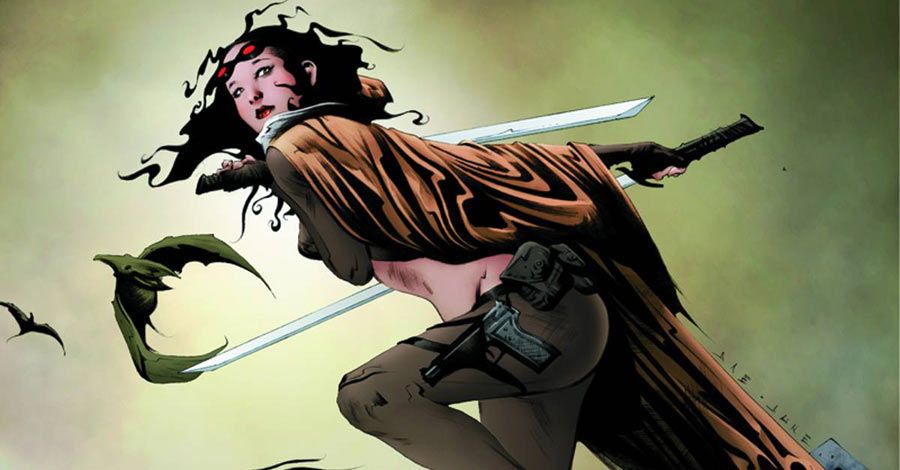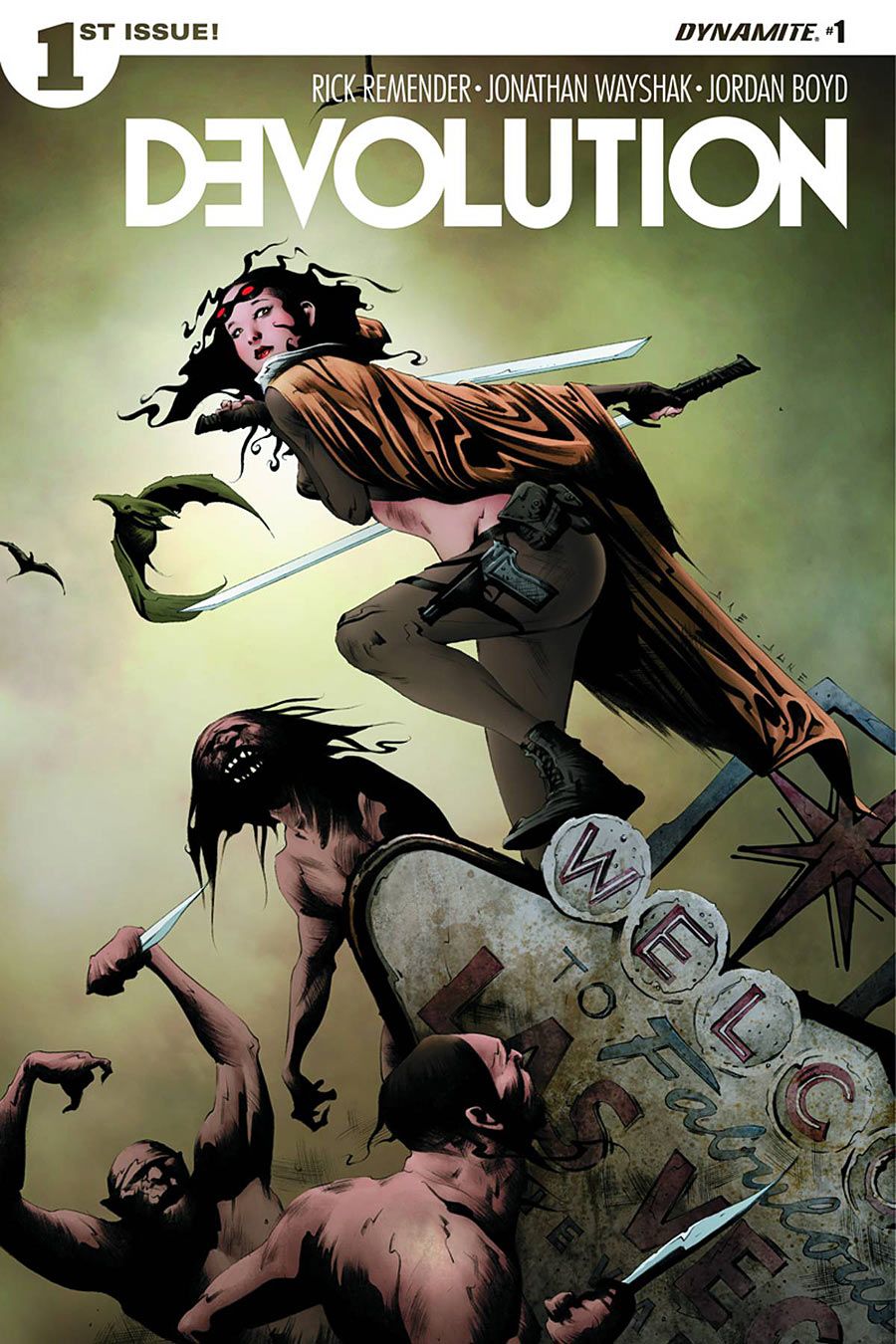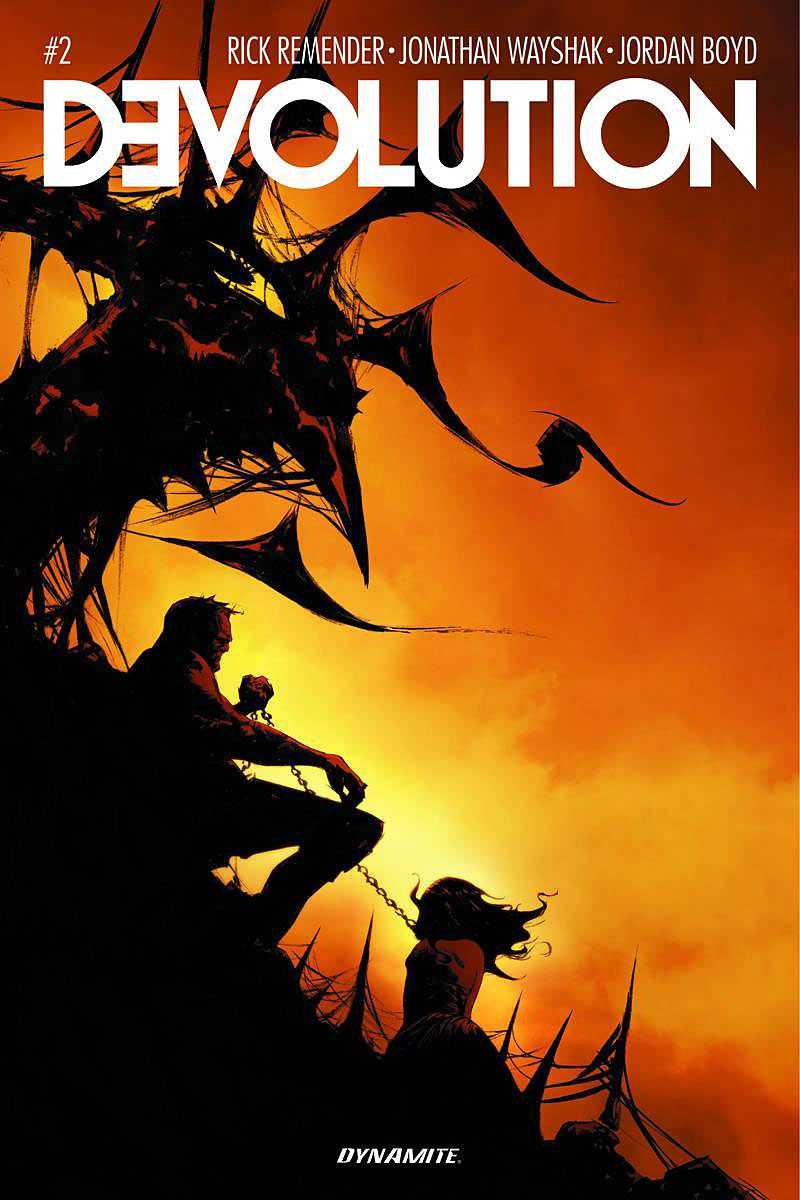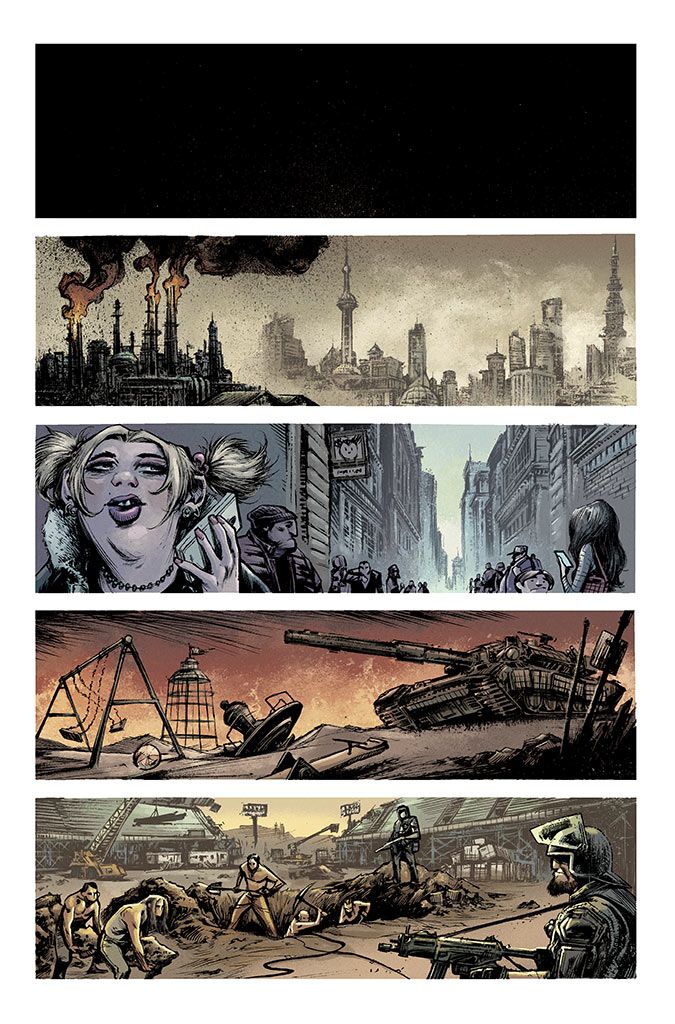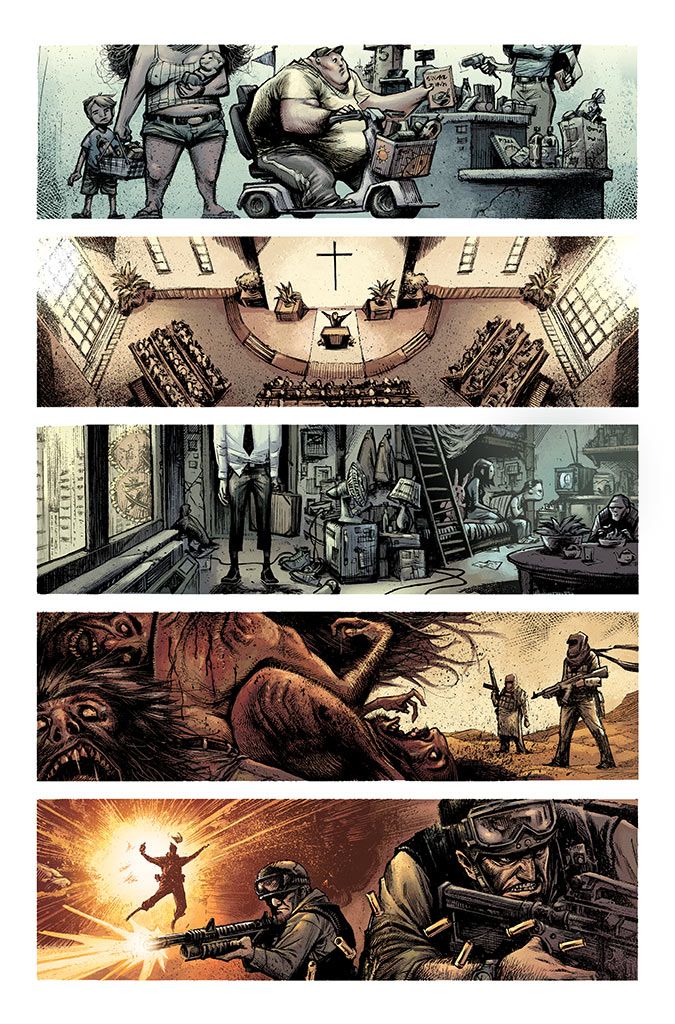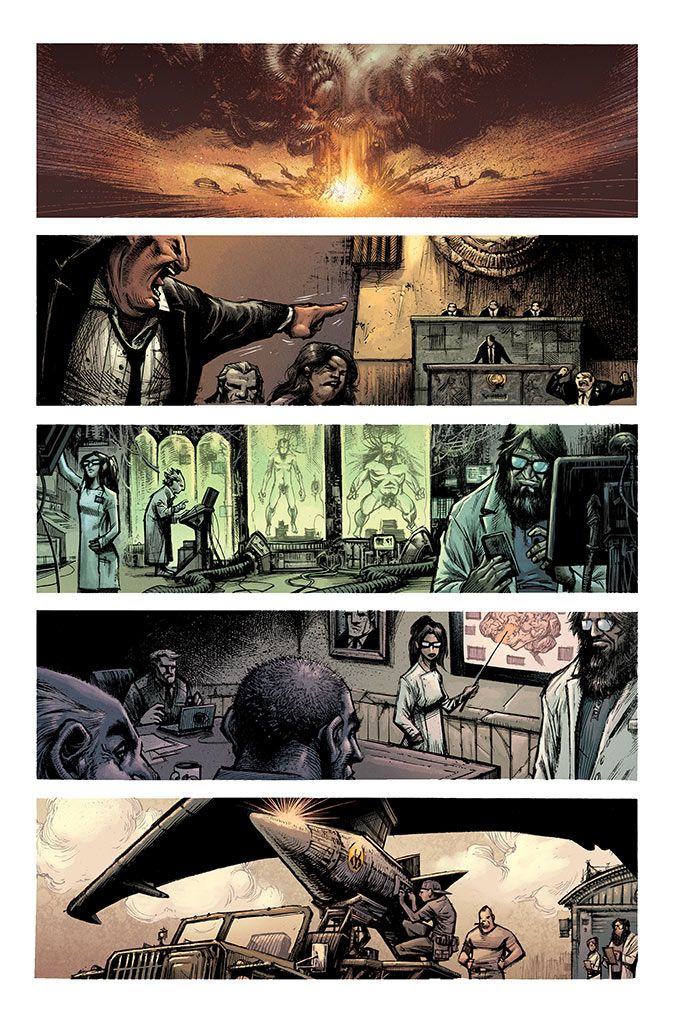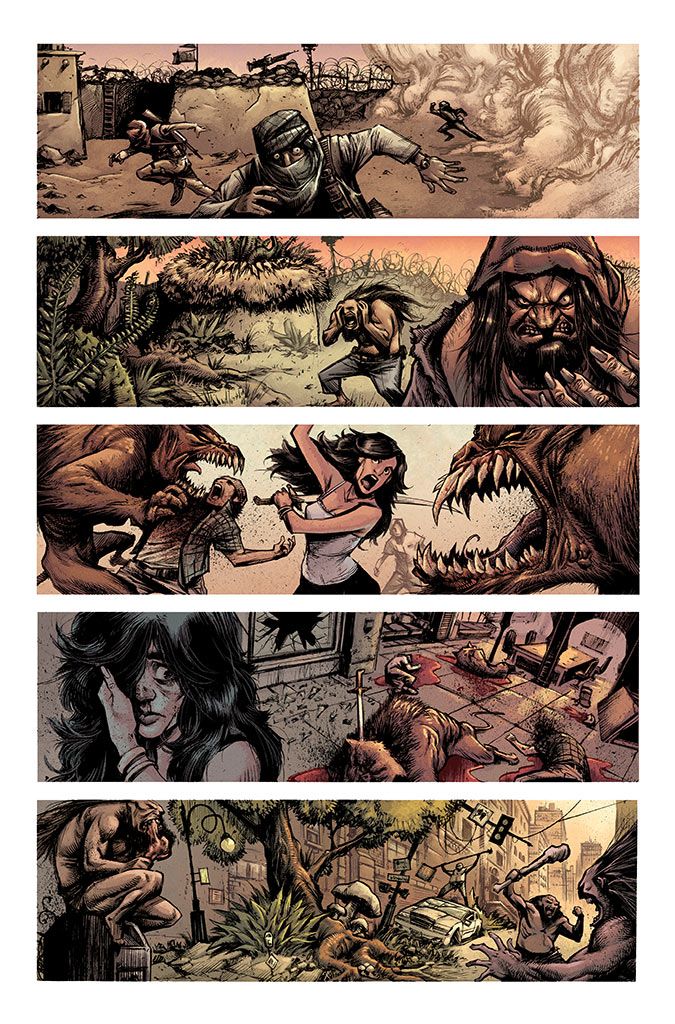Evolution has been a defining factor on our planet since life began. Human beings have played a part in that process, but what would happen if they were given the means to control it and even reverse it via science? Like all technology mankind was never meant to have, the Devolution agent could have catastrophic results if it ever got out of control. The world that arises in its aftermath would be almost unfathomable, and those who managed to survive without devolving would be forced to adapt by devolving, at least culturally, in order to survive.
Dynamite Announces Artist and Colorist for Rick Remender's "Devolution"
These are central tenets fan-favorite writer Rick Remender and artist Jonathan Wayshak will explore in "Devolution," their five-issue miniseries for Dynamite Entertainment that begins in January. CBR News spoke with Remender about the world of the series, his protagonist, the humans and devolved monsters she'll cross paths with, and how the series has evolved over the years since he began working on it in 2005.
CBR News: Rick, let's kick off with the central premise of "Devolution." I understand this is a post-apocalyptic tale, but the reason society crumbled is actually a chemical agent that devolves living beings back into more primitive organisms. Is that correct?
Rick Remender: Yes, in the story the military had been looking for new ways to handle all of the many conflicts that were arising around the planet and one thing that they concocted was a chemical de-evolution agent that would shrink up the part of the human brain capable of believing in God. So essentially they wanted to do away with religion, and thus, war.
Of course the unintended consequence of this is that the agent being used to de-evolve this part of the human brain is way more powerful than it seemed in testing, and once it gets into the ground water, into birds, onto planes everything starts to be effected. We get a reverse evolution process and reverse mutations. So things that were linked throughout history like, say, chickens and velociraptors and maybe even things that weren't linked [Laughs] start to emerge on the planet and everything starts to slowly devolve.
Over time everything on the planet devolves. So we have lots of neanderthals and a multitude of crazy critters and giant spiders. The only people left that are still sapien are the ones who were given the antidote to the serum and inoculated. This includes people in the Marine Corps who were using the serum in the field and some scientists scattered around the world.
One of those scientists believes there is a reevolution agent awaiting them in a laboratory in San Francisco where this stuff was created. So his daughter is on a pilgrimage to make her way there and try to save the human race.
It sounds like this a series where you and artist Jonathan Wayshak can have a lot of fun imagining and depicting everything from dinosaurs, to cavemen, to weird missing link style monstrosities.
That's about right. When I first wrote this story 10 years ago that was what made me want to do it, the visuals. It's also a nice opportunity to comment on the devolution of our society, and mankind in general. More than anything though it was really an excuse to do something that felt like "Xenozoic Tales." Back in the days I wrote this I was rereading and attempting to emulate the fun of EC Comics, and when I wrote down the pitch for this, which was basically "Jurassic Park" meets "Road Warrior," I felt pretty confident that it would be a fun comic book.
When you and I first chatted about "Devolution" back in 2012 it was almost ready to go with a different artist. How has the three years since we chatted and finding a new artist in Jonathan changed the book? Where did you two initially meet?
I've known Jonathan for 15 years. He's very close friends with Jerome Opeña and Harper Jaten, two of my good friends and long time collaborators. They've all worked on various books together. They used to do an anthology out of the Bay Area called "Town of Crazies," and Jonathan is just an exceptionally talented artist that I've always wanted to work with.

My schedule made it impossible for my brilliant pal Paul Renaud to do the series and I sort of gave up on the book. But Nick [Barrucci] at Dynamite was beyond insistent we still do the book. So I went on the hunt for somebody who could still make use of the setting in a way that would be visually spectacular, because really that's what this book is. It's a lot of fun visuals, cool action, and some twists and turns. Plus I needed somebody who could do what Jon does, which is a very textured, interesting approach to strange creatures and plant life.

So Jon is somebody I wanted to work with for a long, long time and I was able to wrangle him and get his schedule to work. He was able to come in and draw a comic book that I wrote 10 years ago and made me excited for the project again.
Earlier you mentioned the survivors of the devolution agent's rampage were the people who were inoculated against it. Will we focus on those people or expand out further?
Because the agent was being used by the American military it was just the military, some scientists, and some of their family members that were given the antidote because the scientists feared what was coming.
Our main character is Raja, a woman who's father was a Saudi Arabian scientist, part of a big team of people working on the devolution agent. So he gave his daughter, Raja, the inoculation as well when he saw things going south.
And where is Raja both physically and emotionally when you pick things up with her in issue #1?
We open in medias res and she's been trekking across the United States for a number of years. Things haven't been going great for her and they continue to get worse.
Her father was part of a very secret illuminati-style scientific organization that was working with various military aspects of the industrial complex here in the United States as well as serving an international idea and need for a solution to the many bloody conflicts that were taking place. So she's hip to a lot of what's happened. She's also very, very driven because her father's involvement in all of this makes her feel guilty. She feels this is very much on her shoulders as the last still sapien person who has the knowledge of the reevolution agent. So she's quite driven and she's quite feral. There's a little of the classic trope in there.
What teases can you offer up about the supporting cast of characters Raja will encounter on her journey?
That's where it gets kind of fun. She's going to end up running afoul of a group of marines who in classic sense have devolved in their own way. They've built a very unhealthy society. It's basically reverted into a place where the strongest control everything and you've got a lot of various ugly components that have taken the foreground in their little society.
So she makes a decision to do the right thing in the story and ends up involved in events in this little town. She's probably going to wish she hadn't become involved. That sets up the change of direction in the story and then we set out and start to see a little more of the world and what things are like. A lot of the conflict between the cast members she meets in this military installation will play as the main threat while they are making their way across the West Coast.
RELATED: Remender & Tocchini's "Low" Examines the Buoyancy of the Human Spirit in an Aquatic Dystopia
It seems like there may be similarities between "Devolution" and your creator-owned Image series "Low" in that both series involve societies that are crumbling and devolving and female protagonists driven by faith to look for something better. Is that a fair comparison?
There are definitely some structural similarities, classic "journey to the solution" foundation. I think this is far less build on emotion and character. While there are some examinations and snap shots on the devolution we see happening all around us now, "Devolution" is really a classic '80s action film at its core.
In the world of "Devolution" is it possible to be more than selfish? Is altruism a viable motive for actions in this world?
It's not. Altruism is barely a motive that works for the one character that has it, and it will be tested, obviously. No one else we meet has any idea that there's a way to solve this situation that the world is in, and a number of people we meet are the alphas of their tribe. They quite like things how they are. So alternately it's down to each one of the individual characters, but it's much like Ripley in "Aliens" that there's one strong character in the center of it all with a belief who is pushing forward. Then the rest of them are either bouncing off of that motivation or they are trying to get in line with it. There are a number of different motives being expressed through the different cast members and not many of them are in line with one another.
Since you've been developing this series for such a long time, is this a tale that we'll watch unfold over a number of arcs or a more contained story?
I wrote this as a five-issue miniseries around the time I was working on the second arc of "Fear Agent." [Laughs] So back around 2006, and it's a just a quick, fun, little miniseries with a very fun "Twilight Zone" twist at the end. It wasn't built to be more than five issues.
Jon Wayshak and Jordan Boyd together with these Jae Lee covers has made the book a real sight to behold. It's a fun story with a lot of gorgeous art by two guys who I think poured everything into it.
"Devolution" debuts January 20, 2016 from Dynamite.

